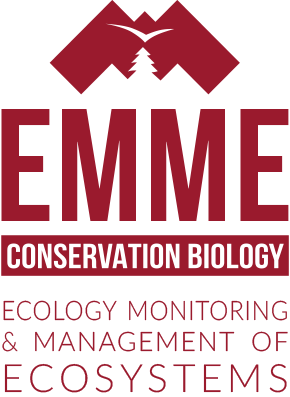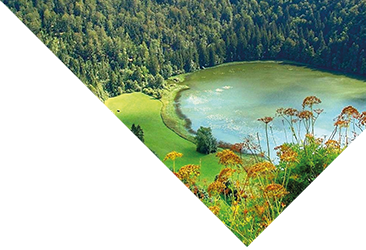Welcome to the Ecology, Monitoring and Management of Ecosystems (EMME) International Master website!
Bienvenue sur le site web du Master International Ecology, Monitoring and Management of Ecosystems (EMME) !
Supported by the Investissements d’Avenir programme, this degree has been offering an original range of theoretical and practical courses in ecology, conservation biology and ecosystem management since 2017. It is open to students from France and abroad, and over 80% of the courses are taught in English.
The EMME Master’s degree aims to train future scientific leaders in ecology, as well as future managers and project leaders working to conserve and manage biodiversity and ecosystems.
From the start of the academic year in 2024, the Master’s programme will structure its teaching and assessments around the validation of the 6 key competences below, which correspond to the expectations of the professional world targeted by the course (consultancies, local authorities, the voluntary sector, government agencies, research, etc.).
- Designing, managing and leading a project in ecology and conservation
- Integrating the regulatory, institutional and societal framework
- Understanding and integrating fundamental knowledge of ecology and conservation
- Implement a data collection strategy in the field and in the laboratory
- Analyse and interpret data relating to biodiversity and ecosystem functioning
- Providing scientific or environmental outreach
The Master’s programme lasts two years. The courses are designed on the principle that biodiversity conservation must be based on a systems approach, linking knowledge at different levels of biological organisation and on different spatial and temporal scales, combining the key disciplines of ecology with recent technological developments in the fields of numerical ecology, molecular ecology, monitoring and management of populations and ecosystems.
Course content is based on the scientific expertise of teaching staff in the fields of functional ecology (ecosystem structure and function, population and community ecology), palaeoecology (long-term evolution of ecosystems), ecotoxicology (transfer and effects of pollutants), epidemiology (transmission of zoonotic pathogens), conservation biology (threats to animal and plant species), numerical ecology and the design of research protocols. The Master’s programme is also enriched by the contribution of conservation professionals and managers, with the aim of placing the teaching in the wider context of project management and decision-making procedures. Professionals are involved in the continuous improvement of the teaching.
Particular attention is paid to practical work experience throughout the course, through internships (2-3 months in M1 and 4-6 months in M2), tutored projects spread over the first three semesters, and practical and supervised work.
Field sessions enable students to put into practice the methods and ideas presented to them. Each year, they take part in at least one week-long continuous field session, and in several field schools, enabling them to test hypotheses concerning the potential impact of anthropogenic disturbances on animal or plant populations or communities, particularly in the context of the various activities that exist in the Jura Mountains, known for its remarkable landscapes, its typical ecosystems (peat bogs, wooded pastures, etc.) and its species of conservation concern (lynx, etc.).
Location
The EMME is run by the Université Bourgogne Franche-Comté – a regional collective of universities including the Université de Franche-Comté (UFC). Practically, almost all of the lectures and teaching will be provided by UFC in Besançon. Many field trips will also be based away from Besançon, with students reimbursed for travel and (in the case of multi-day trips) provided with accommodation. Students may also be based away from Besançon for the internships in M1 and M2, depending on the research body they are working with.
Steering committee
- Julien Azuara, julien.azuara@univ-fcomte.fr, plant ecology, paleoecology
- Marie Brocard, marie.brocard@univ-fcomte.fr, teaching assistant
- Michaël Coeurdassier, michael.coeurdassier@univ-fcomte.fr, animal ecology, ecotoxicology
- Rafael De Camargo, rafael.de-camargo@ubfc.fr, macroecology, biogeography
- Frédéric Gimbert, frederic.gimbert@univ-fcomte.fr, ecotoxicology
- Hélène Masclaux, helene.masclaux@univ-fcomte.fr, aquatic ecology
- Jelena Pantel, jelena.pantel@univ-fcomte.fr, community ecology
- Francis Raoul, francis.raoul@univ-fcomte.fr, eco-epidemiology, food web ecology
- Renaud Scheifler, renaud.scheifler@univ-fcomte.fr, animal ecology, ecotoxicology, stress ecology
- Mickaël Sage, mickael.sage@univ-fcomte.fr, animal ecology, geoinformatics
- William Apollinari, william.apollinari@educagri.fr, environmental law and economy
International Students
The course is open to strong international applicants with the required level of English. The course is almost entirely in English, with all exams and assessments in English, though at least a basic level of French is recommended for daily life. Offers will be made provisionally on the condition that applicants are able to secure a visa from the French government. Any questions specifically pertaining to the process of moving to Besançon and registering with the university as an international student should be directed to the UBFC International Mobility coordinator. They can currently be reached at this address: mailys.claudio@ubfc.fr
Registration fees for international students for the academic year of 2022/2023 were €335.





